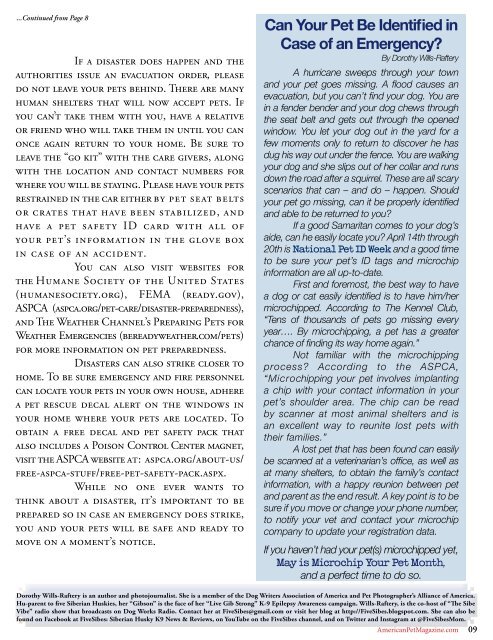HELP Animal Welfare - American Pet Magazine ...
HELP Animal Welfare - American Pet Magazine ...
HELP Animal Welfare - American Pet Magazine ...
You also want an ePaper? Increase the reach of your titles
YUMPU automatically turns print PDFs into web optimized ePapers that Google loves.
...Continued from Page 8<br />
If a disaster does happen and the<br />
authorities issue an evacuation order, please<br />
do not leave your pets behind. There are many<br />
human shelters that will now accept pets. If<br />
you can’t take them with you, have a relative<br />
or friend who will take them in until you can<br />
once again return to your home. Be sure to<br />
leave the “go kit” with the care givers, along<br />
with the location and contact numbers for<br />
where you will be staying. Please have your pets<br />
restrained in the car either by pet seat belts<br />
or crates that have been stabilized, and<br />
have a pet safety ID card with all of<br />
your pet’s information in the glove box<br />
in case of an accident.<br />
You can also visit websites for<br />
the Humane Society of the United States<br />
(humanesociety.org), FEMA (ready.gov),<br />
ASPCA (aspca.org/pet-care/disaster-preparedness),<br />
and The Weather Channel’s Preparing <strong>Pet</strong>s for<br />
Weather Emergencies (bereadyweather.com/pets)<br />
for more information on pet preparedness.<br />
Disasters can also strike closer to<br />
home. To be sure emergency and fire personnel<br />
can locate your pets in your own house, adhere<br />
a pet rescue decal alert on the windows in<br />
your home where your pets are located. To<br />
obtain a free decal and pet safety pack that<br />
also includes a Poison Control Center magnet,<br />
visit the ASPCA website at: aspca.org/about-us/<br />
free-aspca-stuff/free-pet-safety-pack.aspx.<br />
While no one ever wants to<br />
think about a disaster, it’s important to be<br />
prepared so in case an emergency does strike,<br />
you and your pets will be safe and ready to<br />
move on a moment’s notice.<br />
Can Your <strong>Pet</strong> Be Identified in<br />
Case of an Emergency?<br />
By Dorothy Wills-Raftery<br />
A hurricane sweeps through your town<br />
and your pet goes missing. A flood causes an<br />
evacuation, but you can’t find your dog. You are<br />
in a fender bender and your dog chews through<br />
the seat belt and gets out through the opened<br />
window. You let your dog out in the yard for a<br />
few moments only to return to discover he has<br />
dug his way out under the fence. You are walking<br />
your dog and she slips out of her collar and runs<br />
down the road after a squirrel. These are all scary<br />
scenarios that can – and do – happen. Should<br />
your pet go missing, can it be properly identified<br />
and able to be returned to you?<br />
If a good Samaritan comes to your dog’s<br />
aide, can he easily locate you? April 14th through<br />
20th is National <strong>Pet</strong> ID Week and a good time<br />
to be sure your pet’s ID tags and microchip<br />
information are all up-to-date.<br />
First and foremost, the best way to have<br />
a dog or cat easily identified is to have him/her<br />
microchipped. According to The Kennel Club,<br />
“Tens of thousands of pets go missing every<br />
year…. By microchipping, a pet has a greater<br />
chance of finding its way home again.”<br />
Not familiar with the microchipping<br />
process? According to the ASPCA,<br />
“Microchipping your pet involves implanting<br />
a chip with your contact information in your<br />
pet’s shoulder area. The chip can be read<br />
by scanner at most animal shelters and is<br />
an excellent way to reunite lost pets with<br />
their families.”<br />
A lost pet that has been found can easily<br />
be scanned at a veterinarian’s office, as well as<br />
at many shelters, to obtain the family’s contact<br />
information, with a happy reunion between pet<br />
and parent as the end result. A key point is to be<br />
sure if you move or change your phone number,<br />
to notify your vet and contact your microchip<br />
company to update your registration data.<br />
If you haven’t had your pet(s) microchipped yet,<br />
May is Microchip Your <strong>Pet</strong> Month,<br />
and a perfect time to do so.<br />
Dorothy Wills-Raftery is an author and photojournalist. She is a member of the Dog Writers Association of America and <strong>Pet</strong> Photographer’s Alliance of America.<br />
Hu-parent to five Siberian Huskies, her “Gibson” is the face of her “Live Gib Strong” K-9 Epilepsy Awareness campaign. Wills-Raftery, is the co-host of “The Sibe<br />
Vibe” radio show that broadcasts on Dog Works Radio. Contact her at FiveSibes@gmail.com or visit her blog at http://FiveSibes.blogspot.com. She can also be<br />
found on Facebook at FiveSibes: Siberian Husky K9 News & Reviews, on YouTube on the FiveSibes channel, and on Twitter and Instagram at @FiveSibesMom.<br />
<strong>American</strong><strong>Pet</strong><strong>Magazine</strong>.com 09



